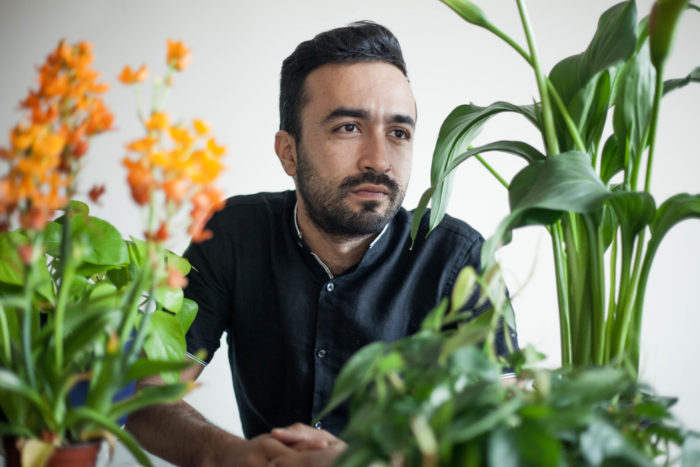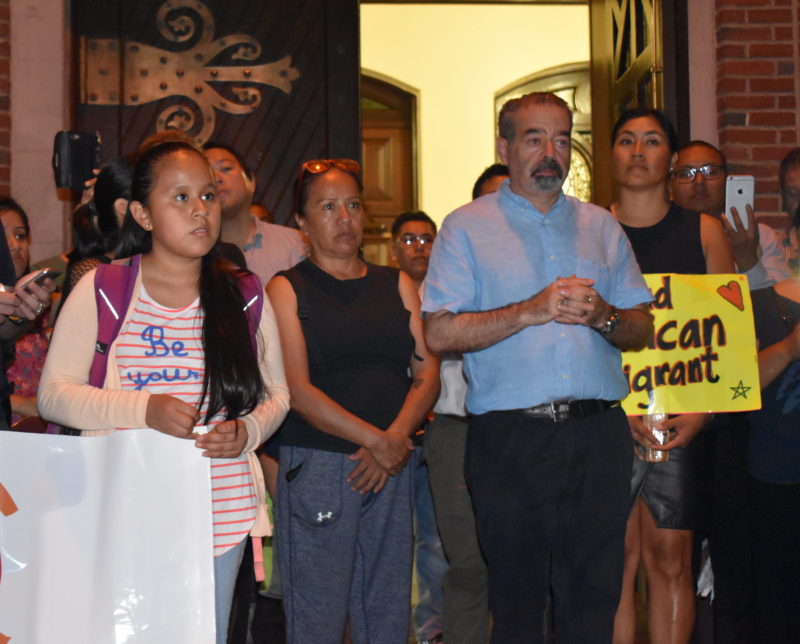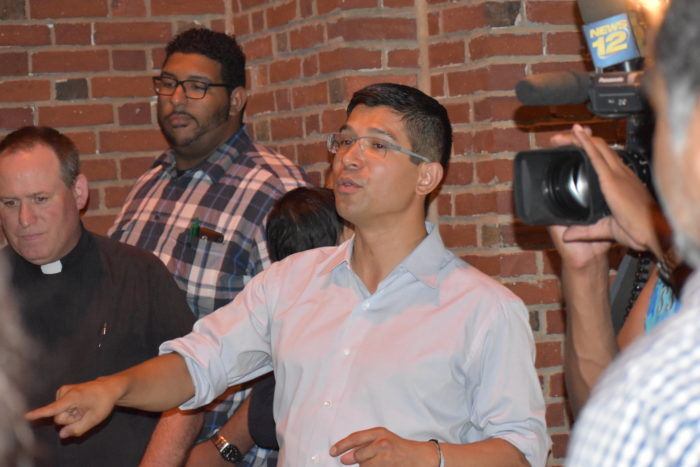How the Dreamers Make Their Mark on Brooklyn
The borough is home to thousands of DACA residents–and their community is looking for ways to protect them
Felipe Quiroz, a Dreamer and musician who came to the U.S. at age 15, has seen his career cast into uncertainty (Photo by Itzel Alejandra Martinez)
Felipe Quiroz, 30, is a Dreamer and an accomplished musician based in Bushwick. He has thrived since he came to the U.S. as a teenager, thanks in recent years to the policy of Deferred Action for Childhood Arrivals (DACA). Quiroz was able to tour in Europe for several years under a special permit that DACA residents can apply for–and pay a hefty fee. Four years ago, he and his brother started a bicoastal production company, Fruit Punch Media Blenders. But the Trump Administration’s move last week to end the DACA program threw Quiroz’s life and business into uncertainty. Now unable to secure a travel permit, Quiroz said he had to cancel a tour he was planning to Colombia, which would have been his first trip back since he left 15 years ago.
Dreamers like Quiroz make up a significant portion of Brooklyn’s economic and social fabric, which contributes to the sense of alarm about Trump’s announcement and the mobilization to oppose it. Of the estimated 42,000 Dreamers residents in New York State, about 22,000 live in Kings County, according to a 2016 report by the Migration Policy Institute, a non-partisan think tank. In fact, Brooklyn ranks 13th in counties across the U.S. with the most DACA-eligible residents, the report said. “DACA gives the Dreamers, some of the most talented, ambitious people in our community, a chance at their dream jobs,” City Council member Carlos Menchaca told The Bridge last week at a pro-DACA rally in Sunset Park.
Brooklyn’s large population of Dreamers is partly a reflection of its culture of assimilation. Waves of immigrants have defined its economy, culture and identity as they established roots, opened businesses and supported their families. Along the way, the borough has built a support network for immigrants navigating the challenges of work visas, schooling, and citizenship. Now that network is being tested.

Members of a rally supporting the Dreamers last week at St. Michael’s Roman Catholic Church in Sunset Park (Photos by Steve Koepp)
“Many of these young folks come from families with the dream of starting a business,” said Julia Jean-Francois, director of program services for the Center for Family Life, based in Sunset Park. The non-profit offers legal counsel, employment training and other services, including a program that supports the development of cooperative businesses. “The tragedy right now,” she said, “is that the incredible potential of these young people and their accomplishments are being discounted. Their potential to contribute to building this community, supporting families, supporting their family of origin–it’s undercut by this decision.”
Quiroz’s journey is a typical Dreamer’s tale, with its mixture of hope and stress. After he arrived with his family in Flushing, Queens, he attended Manhattan International High School, then applied to City University of New York, which accepts undocumented students for in-state tuition fees. He studied music, a lifelong passion, and all went smoothly until he neared graduation and realized he faced a seemingly insurmountable roadblock. “I really had no idea what I was going to do,” Quiroz said. “I had a degree, but no one could hire me.”
Then, with “perfect timing,” recalls Quiroz, along came DACA. Put in place in 2012 by the Obama Administration, the program offers temporary protection from deportation to immigrants who arrived to the U.S. as children, allowing them to obtain work permits, test for driver’s licenses, and complete their schooling. Though these so-called Dreamers pay taxes, they are not able to apply for benefits like food stamps or healthcare through the Affordable Care Act.
“It really changed things,” said Quiroz of securing DACA status. “But more than the ability to work, it changed my drive. For a long time, I felt like there were many things I saw people doing that I knew I couldn’t do. Once that went away, I felt like the sky’s the limit. I felt empowered.”
That boost in confidence was one of the major, positive side effects of the policy. “I’ve seen a big transformation for DACA students in Brooklyn,” said Juan Cuautle, the cooperative business developer at Center for Family Life. “Over one or two years in the [cooperative] program, you see them transformed into entrepreneurs.”
To be sure, much is ambiguous and even contradictory about the Trump Administration’s new policy. The President has kicked the issue over to Congress, challenging legislators to pass broader immigration reform before DACA’s protections start phasing out in March. At the same time, the President has tried to be reassuring, tweeting, “For all of those (DACA) that are concerned about your status during the 6 month period, you have nothing to worry about – No action!” However, his decision has set off a rush among the 154,000 DACA residents whose status would expire in the next sixth months to renew their permits; they face a deadline of Oct. 5 and a renewal fee of $495.

City Council member Carlos Menchaca, at the Sunset Park rally, is behind two bills in the council to provide more protection for the Dreamers and other immigrants (Photo by Steve Koepp)
Yet, in business, uncertainty is problematic. “For the economy, DACA termination means that businesses are confused about what will happen if the March date comes and Congress still hasn’t acted,” said Menchaca, whose district includes Sunset Park and Red Hook. “The business community needs to organize as one voice and tell the President and Congress to pass a comprehensive immigration reform bill to save the Dreamers so they can keep generating national economic benefits.” In some cases, business owners may be blindsided by the problem. “If you are a business owner, maybe two, three or even ten of your employees are dreamers, but you don’t know that because you didn’t have to ask. You’re relying on their Social Security number and work permit,” said Favio Ramirez-Caminatti, executive director of El Centro Del Immigrante, an immigrant-services group.
Advocates for the dreamers are fighting back on multiple fronts, including the courts. Locally, council member Menchaca, chairman of the council’s Committee on Immigration, said his committee has proposed two bills to help guide and protect the Dreamers. One would create an inter-agency task force to coordinate city services to immigrants; the second bill would expand the role of the Mayor’s Office of Immigrant Affairs.
Immigrant-advocacy groups have mobilized as well. Make the Road New York, a Bushwick-based organization profiled by The Bridge this June, is fighting in federal court to preserve DACA, adding claims to its case after Trump’s recent decision. Besides fighting for immigrant rights, the group offers a range of services, including a summer job program for DACA youth. Ricardo Aca, a Dreamer and Make the Road member who lives in Bushwick, said that before DACA, his college plan was limited to an associate degree. “After DACA, I saw what ambitious kids were doing,” he said, and now is in his last year of a four-year bachelor’s degree program at Baruch College. His DACA status, if revoked, would end next year. “I feel betrayed by the system,” he said. “We’ve proven we have no criminal records, we’ve given all our info to the [federal government], we’ve been contributing to our country through legal work permits.”
Jean-Francois, of the Center for Family Life, described the anxiety among Brooklyn Dreamers as a response to what she called “a campaign of fear” from the current administration. “We’re trying to create a counter-narrative to that terror narrative. With the DACA kids, we’re showing them they’ve made their mark, and we celebrate and lift up the incredible contributions you’ve made.” She said the organization is working on strategies for Dreamers to “resume their path,” whether through work visas or strategizing how to start an international business. “One of the things we’re still conveying to the young people is that, really, the sky’s the limit,” she said.










